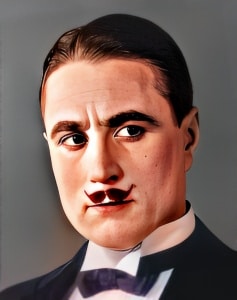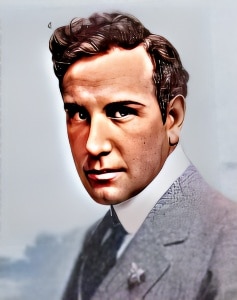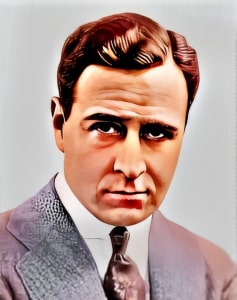 Ivor Novello, born David Ivor Davies on January 15, 1893, in Cardiff, Wales, was a multifaceted talent who left an indelible mark on the entertainment industry during the first half of the 20th century.
Ivor Novello, born David Ivor Davies on January 15, 1893, in Cardiff, Wales, was a multifaceted talent who left an indelible mark on the entertainment industry during the first half of the 20th century.
Renowned as a Welsh actor, dramatist, singer, and composer, Novello became one of the most beloved and popular figures in British entertainment.
Novello’s early life was steeped in music, being born into a musical family. His initial successes came as a songwriter, with his breakout hit, “Keep the Home Fires Burning,” capturing the hearts of many during World War I. This song, penned in 1914 with lyrics by American Lena Guilbert Ford, resonated deeply during the war and catapulted Novello into the limelight at the young age of 21.
As a boy, Novello demonstrated his musical aptitude, singing successfully in the Welsh Eisteddfod. His mother, Clara Novello Davies, a renowned singing teacher and choral conductor, played a significant role in shaping his early musical influences. Under her guidance, Novello encountered prominent figures in the performing arts, fostering his passion for music and performance.
Novello’s formal education included studying harmony and counterpoint with Herbert Brewer, the cathedral organist in Gloucester. Despite Brewer’s discouragement regarding a musical career, Novello displayed a remarkable talent for songwriting from a young age. At just 15, one of his songs was published, marking the beginning of a prolific career.
Upon moving to London in 1913 with his mother, Novello found a mentor in Sir Edward Marsh, Winston Churchill’s secretary and a well-known patron of the arts. Encouraged by Marsh, Novello embraced composition and adopted his mother’s middle name, “Novello,” as his professional surname.
The outbreak of World War I saw Novello making a significant contribution with “Keep the Home Fires Burning,” a poignant anthem that resonated with the wartime experience. Despite avoiding enlistment until June 1916, Novello eventually served in the Royal Naval Air Service, contributing to the war effort.
Post-war, Novello diversified his career, transitioning to acting in British films and later on stage. His foray into cinema included roles in silent films directed by Alfred Hitchcock, such as “The Lodger” and “Downhill.” Onstage, Novello starred in the first London production of Ferenc Molnár’s “Liliom” in 1926.
Ivor Novello played the role of Joseph in the 1923 film “ The White Rose.” This was his American movie debut, directed by D. W. Griffith. The film marked an early milestone in Novello’s career as both a composer and an actor. Novello’s versatility allowed him to excel in various entertainment fields, from composing popular songs to acting on both stage and screen.
The 1920s marked Novello’s ascendancy in both the acting and musical spheres. His popularity soared, and he became the quintessential matinee idol, starring in numerous films and earning a lucrative contract with Gainsborough Pictures. Novello’s ability to effortlessly blend charm and glamour made him a sought-after figure in the British film industry.
Novello’s return to composing in the 1930s marked a new chapter in his career. His musicals, characterized by operatic elements, enjoyed immense success. Notable productions included “Glamorous Night” (1935) and “The Dancing Years” (1939). Collaborating with lyricist Christopher Hassall, Novello’s musicals became synonymous with romance and charm.
Throughout the 1930s and early 1940s, Novello’s career thrived, with successful productions like “Perchance to Dream” (1945) and “King’s Rhapsody” (1949). However, legal troubles and a brief prison term in 1944 cast a shadow over his personal and professional life.
Despite these challenges, Novello continued to captivate audiences with his theatrical productions. “Gay’s the Word” (1951) marked his final show, and tragically, he passed away suddenly from a coronary thrombosis at the age of 58, just hours after completing a performance of “King’s Rhapsody.”
Novello’s legacy endures through the Ivor Novello Awards, established in 1955, which honor outstanding songwriters and composers. The awards serve as a fitting tribute to a man described as the 20th century’s most consistently successful composer of British musicals.
Ivor Novello’s life came to an unexpected end on March 6, 1951, succumbing to a coronary thrombosis at the age of 58. This unfortunate event occurred shortly after he had completed a performance of “King’s Rhapsody,” one of his last full-scale productions.
In the aftermath of his passing, Novello’s legacy endured through various tributes and commemorations. He was cremated at the Golders Green Crematorium, a place that would become a significant part of his posthumous remembrance. His final resting place is marked by a poignant plaque beneath a lilac bush. The inscription on the plaque reads, “Ivor Novello 6th March 1951 ‘Till you are home once more’,” a heartfelt sentiment capturing the essence of a man whose life had been dedicated to the world of entertainment.
The symbolic choice of a lilac bush, with its fragrant and colorful blossoms, adds a touch of poetic beauty to Novello’s resting place. It serves as a fitting tribute to a man who had brought so much beauty and artistry to the world through his music, acting, and creative endeavors.
Beyond the emotional resonance of his final resting place, the tangible impact of Ivor Novello’s life is reflected in the £160,000 estate he left behind. Adjusted for inflation, this would be equivalent to £5 million in 2021, underscoring the financial success he achieved during his prolific career.
The circumstances surrounding Novello’s death and the subsequent commemoration at Golders Green Crematorium contribute to the narrative of a life lived passionately in the pursuit of artistic excellence. His final performance in “King’s Rhapsody” took on an unintended poignancy, becoming a swan song for a man whose contributions to the arts would continue to resonate long after his untimely departure.
In death, as in life, Ivor Novello remains an enduring figure in the annals of British entertainment. The lilac bush and its accompanying plaque stand as a quiet yet powerful testament to the profound impact he had on the world of music, theater, and film. The echoes of his melodies and the resonance of his performances linger, ensuring that, in the hearts of those who appreciate the arts, Ivor Novello is, indeed, “home once more.”
Loading live eBay listings...




